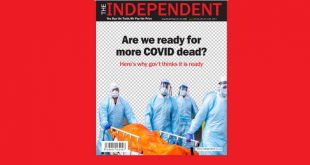
Since she retired from teaching, Sauda Neema, 61, suffers from diabetes, has difficulty sleeping, and often feels general body pain. She believes it is her fate, as an elderly person, to endure pain.
“When you start aging, the first thing you forget about is being fine,” she says, “(But)you can’t sit here all day long contemplating on death. You have to do something.”
Neema believes she has found something she can do about her pain. The former teacher has formed a strict morning schedule involving a cocktail of drugs.
The Independent visited her home in Wakiso district near Kampala on April 27 to witness her solution firsthand. It was 10am and Neema had just finished eating breakfast. Next on her routine,was taking various medicines for her various ailments.
Lack of trust blamed as 80% of patients resort to self-medication
First she poured a deep green herbal concoction into a glass and stirred vigorously before gulping it down.
“After swallowing these, I wait for about 20 minutes and then add this,” she said opening a small white bucket where she keeps drugs. She showed me four different types and followed with explanations of what each treats. “I only go to hospital when it’s really bad,” she says.
But as she was explaining,it became clear she probably does not know exactly which one cures what. There is a drug she prides in, saying it has greatly reduced her body pains.
“It was recommended to me by a friend and cures a number of illnesses,” she says, “It also does not have side effects.”A closer look at the labeling on the numerous small black tablets in a small tin reveals what they actually are – food supplements.
Sadly, Neema’s situation is not unique. Prof. Paul Waako, a Makerere University based Pharmacologist says many Ugandans use medicines without assessment and direction by a health professional. He says research done among patients seeking care at health facilities found that close to 80% of them had gone through a form of self-medication. Waako says self -medication is common with symptoms like fever, headache, body weakness and cough. Often self-prescribers treat this as malaria. But Waako says the symptoms cover most infectious diseases like malaria, pneumonia, and tuberculosis.
Waako, who is also the Dean at the Department of Public Health at Makerere University, says Ugandans generally lack trust in the health system.
“When you don’t trust something, you go for other options unfortunately they are wrong options,” he says.
According to him, unlike in America where a recent study showed that the problem is most pronounced among elderly people of 65 years and above, in Uganda it cuts across all age groups.The study showed that one in six older adult Americans now regularly use potentially deadly combinations of prescription and over-the-counter medications in addition to dietary supplements.
In Uganda, Waako said, mothers routinely self- medicate babies with antibiotic syrups. It also cuts across all socio-economic strata. However, one study has reported that men are more likely to self-medicate than women.
Unqualified health workers
Dr. Robert Balikuddembe, who is also a pharmacologist,says the problem is more serious in Uganda where almost everyone has become a `health worker’ – even those who are not qualified.
“Not everyone who prescribes for you medicine is actually qualified and the challenge is a patient can’t tell whether they are attended to by a genuine person or not.”
Balikuddembe is most concerned about professionals who set up clinic but fail to ensure that their workers are qualified.
“They recommend wrong drugs for diseases,” he said and recalled seeing patients being treated for sleeping sickness but given malaria drugs.
He blames this on poverty and the government’s failure to ensure health centers offer quality care that people can afford. He says qualified doctors have left due to low remuneration and those available are either very expensive to access or have to deal with long queues of patients.
He said because one urgently wants care, they resort to buying drugs over the counter since at the drug shop, no one will ask for a prescription note yet this is what professional practice requires.
Unlike acute diseases where a patient seeks medical advice immediately, Balikuddembe says people with chronic diseases tend to get fatigue as their conditions require them to go the hospital more often. As a result, they resort to buying drugs without medical advice since they, over time, get a feeling that they have learnt all about their illnesses. Also, for diseases like sickle cell and epilepsy, doctors say that patients shy away from seeking medical care because of the stigma associated with.
 The Independent Uganda: You get the Truth we Pay the Price
The Independent Uganda: You get the Truth we Pay the Price


